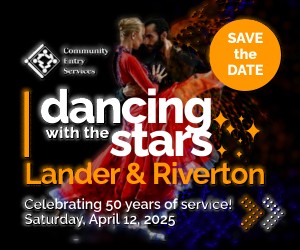Unveiling the Unsung Heroes: 50 Years of Empowering Adults with Disabilities in WY
- Community Entry Services
- Apr 8, 2025
- 6 min read
Updated: Apr 10, 2025
In a world where accessibility and inclusivity are more than just buzzwords, Wyoming has been at the forefront for over fifty years, creating a nurturing environment for adults with disabilities. The commitment of individuals like founder, Gary Hudson, and organizations like The Riverton Sertoma Club in 1974 to this cause has truly transformed thousands of lives. As we celebrate this significant milestone, let’s explore the incredible journey of empowerment, advocacy, and community-building that has shaped services for adults with disabilities in Wyoming.
Riverton and Lander centers have provided care for over 110 adults with disabilities in Fremont County since 1975
The Journey Begins: A Foundation of Care
In the early 1970s, the support landscape for adults with disabilities was starkly different. For most Americans with disabilities life offered either an impersonal institutionalized existence or a sheltered life at home with little prospects of independence or education. Awareness was just beginning, and essential services were limited.
In 1974 local advocates like Gary and Linda Hudson, recognized the urgent need for change and came together to create a service framework focused on dignity, respect, and independence. Returning formerly institutionalized adults to society first began through efforts to find job placement and group homes to proactively promote as much self-sufficiency and independence as possible.
Cooperation between the Wyoming State Training School in Lander, the Sertoma Group Home in Riverton, and local stakeholders like Central Wyoming College and local businesses all led to the creation of Dignity, inc. dedicated to helping de-institutionalize adults with disabilities through job training, private residences and a new model of care.
Within years adults with disabilities were living in half a dozen group homes across several WY counties, and working successfully at a dozen WY based businesses and companies.
This collaboration resulted in groundbreaking initiatives like the establishment of the Wyoming Independent Living Program, Children's Waiver and other initiatives which provide resources across the state, fundamentally changing how adults with disabilities receive support.
Breaking Barriers: A Community Effort & employment opportunities
The past fifty years in Wyoming have spotlighted the community's relentless effort to dismantle barriers. Local organizations, dedicated families, and committed volunteers have formed a dynamic support network tailored to the diverse needs of adults with disabilities.
Individuals with disabilities have gained employment through their job training programs. This type of community-driven effort empowers individuals to engage meaningfully in society.
For instance, in 1982 Neat Repeat thrift stores began to be founded in Lander, Riverton and Jackson providing jobs for many individuals. Work crews found employment at the Grand Teton Lodge, United Steel, Eaton Printing, Teton Village, and other companies. The US Post Office hired individuals with disabilities in 1985. The Tannery of Riverton hired individuals in their packing and sorting department, shipping fishing supplies to LL Bean and Orvis around the world.

In 1985 the City of Riverton and Fremont County entered contracts with Dignity to provide workers at recycling centers, providing dozens of stable jobs for locals over the years.
CES clients help pick up recycling materials from over 110 businesses in Riverton
Empowerment Through Education
Education stands at the heart of adult empowerment. Efforts to provide pre-school services in 1977 through Dignity led to eventually founding what is now Child Development Services of Fremont County. Dignity also launched various educational initiatives focusing on both academic skills and practical life skills.
In 1980 Dignity began to be accredited by the Commission on Accreditation of Rehabilitation Facilities (CARF). Gary Hudson and staff would go on to become nationally respected leaders in CARF and sought for experts by legislators, policy makers and other service providers across WY and the US.
Programs have specifically targeted essential areas like communication, financial literacy, and vocational training. These opportunities boost not just independence but also self-esteem, enabling individuals to navigate life's challenges more confidently.
Celebrating Achievements: First 25 years
1974: The Sertoma Group Home in Riverton, WY is founded
1975: Sertoma Group Home becomes Dignity, Inc.
1982: First Neat Repeat store is founded on S. Federal Blvd. in Riverton.
1984: The first HUD housing units are acquired for clients
1984: The first fundraising event is held with the Dallas Cowboys
1987: Dignity consolidates all offices into a single campus in the CWC technical park in Riverton.
1990: Dignity is rebranded as CES: Community Entry Services, an umbrella that includes Dignity (adults with disabilities) and the newly added Rocky Mountain ReEntry Services (adults with acquired brain injuries).
1991-2015 CES partnered with the Wyoming Life Resource Center to provide vocational training and social skills education to 40 individuals who resided at the Life Resource center.
1997: LEAPS program starts (Learning Empathy and Prevention Steps) to provide information about people with disabilities to 6th grade students so they can have better relationships with fellow students and learn safety skills.

1999 A Lander office and day services were reopened.
2000 The new Millennium brought a long term relationship with High Mountain Seasonings who agreed to provide employment for our clients.
Last 25 years: 2001 to 2025
2003 Growth in Lander resulted in the purchase of the historic Lander Post Office building in 2003.
2003 New Housing
The first totally new construction was completed in 2003 with an open floor plan, wheelchair accessible residence on Vance Street in Lander. A home on Sierra Street in Riverton was also purchased.
2004 This was followed in 2004 with a grant to complete another state of the art accessible house in Riverton on Summit Drive and occupied in 2005 by people receiving services through the Rocky Mountain ReEntry services Division.
2006 January of 2006 was a sad time for CES. Gary Hudson, founder and guide of the organization suddenly passed away while doing a CARF survey in Atlanta, GA.
Friends recalled him as a visionary, a man who believed all people, regardless of abilities, had something to contribute to the community of which they were a part. His vision continued with an improved presence in the Lander community for CES with the remodeling of the historic Lander Post Office building to be used for offices and service provision. This was accomplished through the support of the Wyoming Business Council grant and a USDA Rural Development loan. The building was dedicated in January of 2007 and renamed the Gary M. Hudson Habilitation Center.

Through all of the growth and change, CES continues to strive for excellence through the CARF survey process and has received three year accreditations, the highest possible, from 1981 to the present.
People receiving services through CES were giving back to the communities that empowered them: they had sponsored and helped fly five hot air balloons, they served on three mayor's committees, and ten have been home owners.
Although CES has buildings, one can still not ever “see” Community Entry Services as it isn’t a building, but is “the community”, just as the people with disabilities CES is dedicated to empower, are the community.
Advocacy and Policy Change: Lifting Voices
Advocacy has been instrumental in shaping available services for adults with disabilities in Wyoming. For decades, dedicated local and state advocates have worked tirelessly to influence policies that promote inclusivity and accessibility.
Most of the funding for adults with disabilities comes from the State of WY and Medicare dollars. But for every $1 in cost of care, the government subsidizes less than 85 cents. The difference is made up by private charity.
Festival of Trees, Dancing with the Stars, Art of Love and other local fundraisers have connected us with over 100 local businesses and individual supporters whose generosity has allowed CES to not just survive but thrive despite all the turmoil of Covid, economic recessions and government funding cuts.
Festival of Trees, Dancing with the Stars and Art of Love have all helped raise funds for our work on behalf of adults with disabilities in WY.
A Supportive Network: Building Community Connections
Wyoming’s success in supporting adults with disabilities can be attributed to a strong sense of community built over the years. Families, local non-profits, and supportive neighbors have come together to form networks offering emotional, social, and practical assistance.
These connections empower individuals to feel valued and supported. Studies show that 85% of participants in community programs reported feeling more connected and engaged in their lives, highlighting the importance of community ties.
Looking Toward the Future: Continuing the Legacy through endowment funding
Reflecting on the past fifty years, it's vital to look ahead and shape the future for adults with disabilities in Wyoming.
Ongoing advocacy for resources, continuous improvement in accessibility, and expanding educational initiatives will be crucial in ensuring the next generation of adults with disabilities benefits as those before them have.
CES aims to create an endowment fund for future generations of clients and their families and continue growing its fundraising and communications efforts to inspire support and other initiatives on behalf of the disabled. To make support this effort, please email Joe Stong at Jstong@ces-usa.org or call 307-856-5576 ext. 226 or go to https://www.ces-usa.org/donate
Honoring the Unsung Heroes
50 years ago Gary Hudson and innumerable heroic individuals put in motion this commitment to adults with disabilities in Wyoming. We recognize the myriad individuals who have played vital roles in this journey. From hands-on caregivers to tireless board members, donors and volunteers, these unsung heroes have created pathways for fulfilling lives rich with opportunities for our neighbors who have intellectual, physical, and acquired brain injury disabilities.
As we progress, let us continue to uplift and advocate for those who deserve to be supported, heard, and celebrated.





















Comments